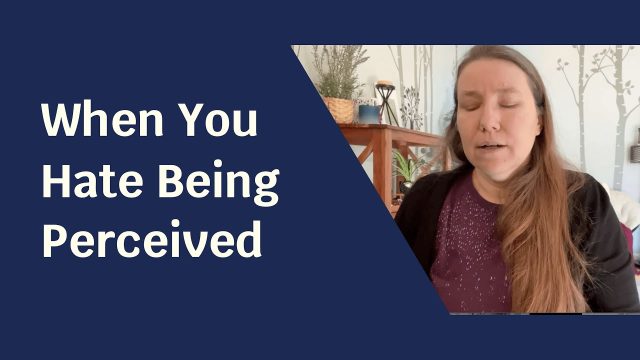
Do you hate being perceived?
I want to talk about something my clients bring up to me over and over, and that I have a lot of personal experience with, and that’s feeling bad when other people are around even when nothing bad is happening, even when they’re not doing anything to you, that just being perceived feels like too much pressure.
From what I’ve just deconstructed in myself, and heard over and over from other Autistic’s stories, I have a theory about this.
I’m wondering if you grew up being shamed, excluded, told off, or punished for your natural Autistic behaviors, language, communication style, how you did things, how you thought through things, the questions you asked or didn’t, how you socialized or didn’t? And did you responded to that by trying to conform to what other people expected of you, but never really getting it completely right, like there were gaps in the mask, bits you could never quite get right? My theory is that this might lead to a strong sensitivity to being perceived.
And I’m wondering if, for you, just knowing that someone else is around creates this sense of pressure? Is it a pressure to try to conform to that theoretical model of what people expected of you, or what you thought they expected of you, but that never seemed achievable?
A disconnect
For me, it was like there was this disconnect between that person, this theoretical person that I tried to create, because it seemed like that would be accepted, and the reality of who I actually was. And that disconnect used up so much energy.
It was like there was this disconnect between that person, this theoretical person that I tried to create.
And so even the thought of being around another person, or other people, of having anyone else perceive me, had strong associations to that energy drain and the bad feelings of always getting it wrong in ways that I couldn’t quite define, so of course, being alone was so much easier.
And there were even be fantasies of becoming a hermit and moving out into the woods to get away from everyone forever.
I’ve talked with enough other Autistic adults at this point that I know it’s not just me. This is a fairly common experience.
But this disconnect between these two models, the theoretical one and your reality, is a huge energy drain, it often creates anxiety, and a lot of psychological and emotional pain, and sometimes even physical pain or illness, and it’s a lot of work to keep in place.
Dismantling these models
When you start to dismantle that theoretical model, bringing it closer to reality–because the other way doesn’t work–you’ve tried that for years–it doesn’t work. When you bring the theoretical closer to reality, it makes life so much easier.
By the way, that’s the kind of work that I that I do, at its essence, when I coach one on one with people. It’s facilitating this process.
So, when you can bring these two models together that’s when being around people starts to feel more possible. And then less draining. And then as you have more genuinely positive experiences, you’re teaching your nervous system that other experiences are possible than the ones that shaped you growing up.
So, when you can bring these two models together that’s when being around people starts to feel more possible.
And as your nervous system and your brain learn to trust that that is possible, and here’s what it feels like to be accepted, here’s what it feels like for things to go okay, you get more comfortable with yourself and more comfortable around other people.
And that begins to reshape those old associations, and that’s when being around other people, and being perceived, feels less intense, and eventually more neutral, and eventually even positive.
This is how I got to the point that I could start talking with other Autistic adults, and then to helping them through their versions of this later identification journey, and how I started coaching, and how I actually look forward to meeting new people in my coaching practice, and how I can do this, making YouTube videos, putting myself out there, and being perceived daily.
This is a whole world to me, and I’ve been allowing it to grow slowly, so that my nervous system can adjust without getting overwhelmed, and it is adjusting and has been doing so for the last few years, and it’s a whole new world.
It doesn’t just happen in one moment. It takes a while, and that’s okay. But it can happen.
I wish you well in whatever point you are in your Journey. Have a neurowonderful day.





8 Responses
The correct word is scrutinized. Please stop using perceived the wrong way
While just about everyone dislikes being scrutinized, for some of us, any perception feels as abrasive as if it were scrutiny, even when it genuinely isn’t. I’ve been working for a long while on dismantling this in myself, but here I’m trying to describe the roots of it.
When I’m alone I know I won’t be judged and there won’t be unexpected changes to my plans
I have adhd and it’s been suggested I may be gifted, not sure if I deal with autism. I thought I dealt with body dysmorphia but now I think it’s this 😳 can this start at a certain age ? And…I have always struggled with my moms serious judgemental behavior, I could not escape from that feeling as she constantly talked about how I looked/dressed/developed/talked, even worse with my older sister so I always felt like hiding my self around her. Ick!!!
This is true and just another example of discrimination and societal abuse towards autistic individuals. When you understand the context and structures, you’re on your way out from under the pressure of it and can condition out of it.
I’ve had autism ruled out but have been diagnosed with ADHD, BPD, and a past of complex trauma but not full C-PTSD as far as we can tell…anyway, I have a lot of symptom overlap. I often fear being perceived as a happy person when I’m not. I’m not a happy person—or at the very least, I’m not outgoing, bubbly, talkative, or social, and this is what I’ve had to pretend to be in the working world.
I’m not working anymore but going through yet more therapy, and I find I’m afraid of what therapy will do to me, if it will change me enough that I really seem like a fully happy, Type A, bubbly, social person, to where even I will look inward and see that kind of person. Being perceived in general is tough enough but being interpreted incorrectly by others is just like double-trouble.
Sobbing because of how relatable for me this is and how much I needed this right now, a whole year after it was posted. Thank you.
What do you mean by “perceived”?
I agree with Jim, the correct term is scrutinised. Completely different meaning.